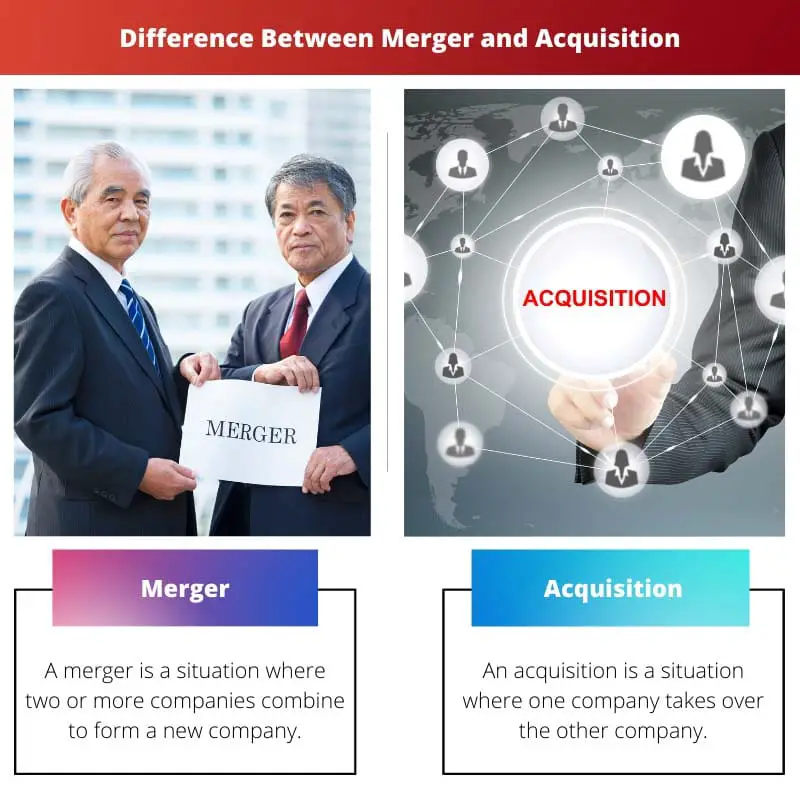In business, mergers and acquisitions are two of the most confusing and misunderstood words. The two words are used in place of one another, although they differ in meaning.
The two words, merger and acquisition, are used to join or connect two companies.
We hear these words in business news, but few people understand the main difference between them.
People who are interested in business or management and choose it as their career path know well the difference between them.
Both these words refer to combining two companies, but they are to be used in different scenarios.
Key Takeaways
- A merger combines two or more separate companies into a single entity, to enhance market position, increase efficiency, or diversify product offerings.
- An acquisition is a process of one company purchasing another, with the acquired company either being absorbed or operated as a subsidiary, to expand market presence or eliminate competition.
- Both mergers and acquisitions are forms of a corporate restructuring aimed at growth and expansion. Still, mergers involve the creation of a new, unified entity, while acquisitions involve one company gaining control over another.
Merger vs Acquisition
A merger is a situation in which two companies get merged and form a new company. They give a new name to the company. Power of the company remains the same for both merging companies. In acquisition, one company takes over the other company. The acquiring company gets all the power and the name of the acquiring company can be used.

Comparison Table
| Parameter of Comparison | Merger | Acquisition |
|---|---|---|
| Definition | The powers remain the same for both merging companies. | An acquisition is a situation where one company takes over the other company. |
| Power | In a merger, a new name is given to the company. | The ultimate powers lie in the hand of the acquiring company. |
| Name | In mergers, there are more legal formalities as compared to acquisitions. | In the situation of acquisition, the name of the acquiring company’s name can be used. |
| Legal formalities | In mergers, there are more legal formalities compared to acquisitions. | In acquisition, there are fewer legal formalities as compared to a merger. |
| Level | In a merger, two or more companies that consider each other to be of the same level come together to form a new company. | In acquisition, the company which is acquiring the other company is considered larger and on a higher level. |
What is Merger?
A merger refers to the process in which two or more different companies, businesses, or entities come together to form a new company or work on a common goal.
A new ownership and management structure is formed. Their strategies are for better approaches to work towards a common desired goal.
Mergers are done to work towards a common desired result, decrease operational costs, increase profits, and become larger in markets.
Usually, mergers are voluntary or friendly, and it includes businesses that are mostly of the same size and level.
Advantages of merger:
- Mergers help to reduce the operational costs of companies.
- It helps two or more companies to work towards a common objective.
- It helps to expand market share. When two or more companies merge and form a single new company, this new company obtains a larger market share.
- In case the businesses are not earning profits, mergers help to prevent the shutting down of such businesses.
- Mergers help to decrease weaknesses and gain a competitive advantage in the market.
- When Companies merge, they share skills, knowledge, resources, and technology which helps to improve the overall growth of the merged companies.
Types of mergers:
- Horizontal
- Vertical
- Reverse
- Conglomerate
- Congeneric
Legal formalities:
In the case of mergers, the companies have to mention all the essential details in writing
And they also have to submit several documents, such as the latest yearly reports, sales and purchase agreements, and all necessary documents related to the merger decision.
The governing merger laws differ from place to place and country to country.
What is Acquisition?
An acquisition is a situation in which one company takes over the other.
The company taking over obtains more than 50 per cent of shares for the acquisition. Mostly, acquisitions do not happen on a friendly basis.
In the acquisition case, the company taking over controls the other company. They are free to take any decisions, such as decisions regarding resources, structures, staffing, and so on.
For the acquired company and its employees, it creates uneasy and insecure feelings.
Advantages of acquisition:
- It reduces the costs of operation.
- Acquisition reduces the amount of taxes.
- It helps to defeat market entry barriers that the company was previously facing.
- The acquisition helps to increase the market shares of the company.
- In an acquisition, the acquiring companies get access to larger capital.
- When two companies come together, they obtain specialists such as human resource specialists or financial specialists.

Main Differences Between Merger and Acquisition
- A merger is the joining of two or more companies or businesses to form a new company, whereas an acquisition refers to the takeover of one entity by another.
- In mergers, there are more governing laws and formalities than in acquisitions.
- A new name is given to the company during the merger of two or more companies. On the other hand, mainly the name of the acquiring company is used during the acquisition.
- In a merger, both companies strengths and power remain the same. The acquiring company gets the final strength and power in the acquisition situation.
- A merger happens when two or more companies at the same level come together and join to form a new company. In acquisition, the company which is taking over the other company is regarded as larger and on a higher level.
- A merger is a friendly action, and it is a mutual decision of both the merging companies, whereas acquisition may be either voluntary or involuntary and may be unfriendly.


The comparison table is really helpful in visualizing the distinctions between merger and acquisition. It’s a great resource for business students and professionals alike.
Absolutely, having a clear understanding of the legal formalities and power dynamics in mergers and acquisitions is crucial for anyone involved in business.
The comprehensive breakdown of the advantages and legal formalities associated with mergers and acquisitions equips readers with a holistic understanding of the intricacies of corporate restructuring.
I couldn’t agree more. This article serves as a foundational resource for anyone looking to delve into the complexities of mergers and acquisitions in the business world.
The article offers a coherent and thorough exploration of mergers and acquisitions, providing a nuanced understanding of the legal formalities and strategic implications of each approach.
Absolutely, the comparison table and delineation of advantages and types of mergers adds substantial value to the comprehensive overview of corporate restructuring provided here.
The depth of insight into the strategic advantages of mergers and acquisitions sets this article apart as a valuable resource for industry professionals.
The comprehensive overview of mergers and acquisitions provides actionable insights into the strategic implications of corporate restructuring. A compelling read!
The strategic advantages of mergers and acquisitions highlighted here offer valuable insights into the intricacies of corporate restructuring, making this a must-read for professionals in the field.
Well-articulated and informative, this article effectively outlines the key differentiators between mergers and acquisitions, making it an indispensable resource for business professionals.
Thanks for the detailed explanation on the differences between mergers and acquisitions. It’s important to have a clear understanding of these terms in the business world.
I agree, mergers and acquisitions are complex concepts that can have a big impact on companies and industries.
This article provides a comprehensive overview of mergers and acquisitions, making it easier to grasp the nuances of each process.
The detailed elucidation on mergers and acquisitions is truly enlightening. It offers a comprehensive understanding of the legal formalities and strategic advantages of each approach.
Absolutely, the detailed breakdown of legal formalities and advantages equips readers with a deeper comprehension of corporate restructuring dynamics.
This piece serves as an invaluable resource for individuals navigating the complexities of business mergers and acquisitions. Well done!
The detailed explanation of both mergers and acquisitions provides clarity for those seeking a deep understanding of these concepts. Well-articulated and informative!
Agreed, this article effectively breaks down the nuances of mergers and acquisitions, offering actionable insights for industry professionals.
The advantages outlined for both mergers and acquisitions make a compelling case for the strategic implications of each corporate restructuring method.
The delineation of merger and acquisition in various scenarios is valuable for understanding the strategic implications and possible outcomes of each process.
Absolutely, this article serves as an educational resource for individuals looking to grasp the complexities of corporate restructuring strategies.
The emphasis on legal formalities and advantages provides a holistic view of the implications of mergers and acquisitions in the business landscape.
The in-depth exploration of the legal formalities and advantages associated with mergers and acquisitions offers a comprehensive understanding of these fundamental business processes.
I couldn’t agree more. This article is a treasure trove of information for anyone interested in the strategic intricacies of corporate restructuring.
The detailed comparison table effectively distinguishes between mergers and acquisitions, providing clarity on the nuances of each process.
I’ve always been intrigued by the complexities of mergers and acquisitions. This article sheds light on the advantages and types of mergers, providing valuable insights into strategic business decisions.
This piece effectively educates readers on the nuances of acquisition, emphasizing the impact it has on operational costs and market entry barriers.
Indeed, the advantages and legal formalities highlighted here offer a well-rounded perspective on the intricacies of corporate restructuring.